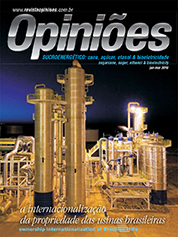Sergio Leme dos Santos
President of Dedini Indústrias de Base
Op-AA-23
Ethanol: on course to internationalization
Time is the lord of reason! We went through the Proálcool Program, we faced political and economic barriers, we lived through ups and downs, we received unjust, and at times, malicious criticism, but time shows that ethanol, as a clean and renewable fuel, is becoming an international and world-wide acknowledged commodity.
Throughout the world, one always hears the same phrase: we need to free ourselves from the dependency on fossil fuels and look for clean energy sources. However, practice has kept a distance from theory all these years, and 2010 may be the year representing the beginning of the harvest of so many years of unlimited efforts of many professionals in Brazil and abroad.
However, in order for this alternative to become a true and sustainable commodity, it is very much necessary that other countries be involved in the production market. Brazil alone as an ethanol producer is insufficient to meet world demand. Brazilian know-how to produce ethanol and technological innovations in the course of recent decades allowed the country to produce the fuel today at a very competitive price in comparison with gasoline, in addition to the advantage that it does not emit greenhouse gases, hence being a compatible option that equalizes the conflict between mitigation of global warming and competitiveness.
About 80% of the Brazilian production are already destined to domestic consumption, most of which to meet the growing demand of “flex fuel” vehicles, which already account for 90% of automobile sales in the country. Apart from automobiles, there is an extensive list of other vehicles that may use ethanol (some still being studied), such as, motorcycles, buses, airplanes, not to mention the emerging ethanol-based chemical industry.
Therefore, even if ethanol production increases, the trend is that a major portion will be destined to the Brazilian market. Brazilians have the know-how and the technology for ethanol to conquer the world and they must take up the exporter role in this industry. Brazilian companies are increasingly in search of promising production markets to expand their field of activity.
Dedini is a company that has focused on exports: currently, between 10 and 15% of the company’s revenues represent machinery and equipment for the sugar and ethanol industry destined for export. To become an even stronger player, it is necessary that the Brazilian equipment industry is able to offer technological solutions that allow new uses, apart from automobiles, such as stationary electric power generation.
The expansion of ethanol consumer and production markets is highly beneficial for Brazil. Establishing new markets, a whole new world of opportunities unfolds for Brazilian industry, in addiction to cooperation opportunities in important development programs of other countries. The statement of the U.S. Environmental Protection Agency, whereby ethanol produced in Brazil is the most advanced in the world and less polluting than corn ethanol (produced in the USA) and concerning European biodiesel, is merely another demonstration that the country is headed in the right direction and that we really have all it takes to become a true powerhouse for this type of fuel.
The decision is an important step in the elimination of the product’s tariff barrier in the USA. However, to meet this international demand, Brazilian producers must invest to expand their production through technological progress. Nowadays, there already exists in the country agricultural technology capable of increasing average productivity by up to 25%, providing gains for all parties interested in strengthening the industry.
The recent alliance between Shell and Cosan is another issue that shows how biofuels are increasingly growing stronger internationally. The two companies have formed a historical strategic alliance in the industry, eliminating important paradigms and opening the industry to a new phase of growth and sustainability. The terrain has already been well prepared for the growth of ethanol, domestically and internationally. Now it is up to companies and the government to unite so that this seed may germinate and become a strong and productive plant.




